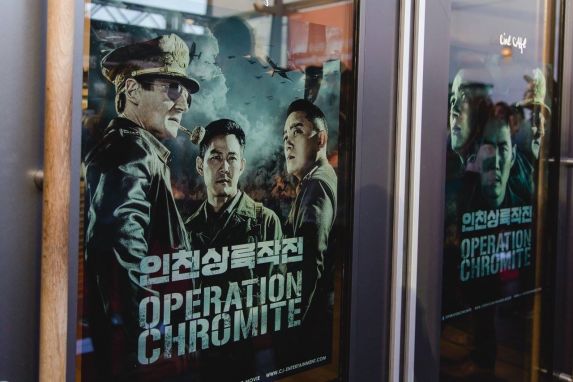A special screening of the Korean film Operation Chromite, hosted by CJ Entertainment, the Korean Cultural Center, and the American Legion Hollywood, was held on August 4th before its American box office release. People poured into the Hollywood American Legion Post 43, including many veterans who had served in the Korean war and their companions. Though the Korean War is quite memorable for the Korean people, it is often called the Forgotten War by Americans, as many veterans who served are unrecognized for their part in defending the South Korea that exists today. The night served as an opportunity to remember and commemorate their sacrifices.
The screening started with a reception held in a bar at the bottom levels of the American Legion. The bar was in the style of the early 1920s; veterans in full dress reminisced about their time in the service, while women in 1950s attire sold goods to raise money for U.S. veterans. Ragtime music and dim lighting were the cherries on top to a night of nostalgia. As people began to migrate from the bar to the theater, one could see the small selection of seats reserved for special guests in attendance. CEO of CJ E&M America and retired Captain in the U.S. Army Mark Shaw, and Ki Chul Lee, Korean Consulate General, opened the showing with a few words of appreciation for the people in attendance. Though many Americans may not recall the Korean War, Operation Chromite and its release in the U.S. will bring increased awareness to the countless sacrifices that eventually brought about the South Korea that stands today.
Operation Chromite on the week of its release was the number one hit in South Korean box offices, with over $18 million in gross sales. The movie is based on the real-life events leading up to the Battle of Inchon, which was a key turning point in the Korean War. General Douglas Macarthur (Liam Neeson) orders Lieutenant Jang Hak-soo (Jung Jae Lee) and his men to carry out a covert mission, code named Operation Chromite, to prepare the way for the invasion on the shores of Incheon. The film showcases a conflict of ideologies which were manifested in the conflicts and fighting in the Korean War. This motif is embodied in the form of the main protagonist Jang Hak-Soo, a North Korean officer who defects to South Korea after the regime uses the phrase “Ideology is stronger than blood” to justify the killing of his father for petty crimes. In the film, Commander Lim Gye-jin (Bum-Soo Lee) personifies the values of North Korean Communism and is representative of the North Korean side of the conflict, outing Jang Hak-Soo during his mission, and providing the North ideas of suspicion that Incheon may be invaded. In a depiction of such a solemn event, the makers of the film found it prudent to include some comedic relief - in the surprising setting of a North Korean base - successfully, which was apparent in the laughter of the attendees. In this way, the film achieved a balance between honest depiction and cinema.
The audience’s ubiquitous response to the film was grateful, as the Korean War had so long gone unrecognized throughout American history. Bringing this piece of cinema to the United States was a salute on behalf of the people who had served in the conflict. In a panel moderated by Brian Chung of All Warrior Network after the screening, Korean War veterans talked about their experiences during and after the war. Many expressed how they were reminded of their time in service, particularly on their time in Korea, while watching the film. One veteran recalled the kindness of the Korean people during his stay and his constant elation on making it through the war, as he was faced with the sobering realization that some of his friends had not. The veterans on the panel thanked the organizers of the event, as they had never really been recognized for their efforts; one recalled the first time their service was recognized when in the early 2000s, a woman said, “Thank you for your service.”
Operation Chromite appealed not only to a sense of national pride, but also to the emotional sympathies of the audience. It offered emotional understanding of the sacrifices required of those who served their countries during that time, while remaining true in its depiction of the often overlooked Korean War.
- By Seoul Journal Intern Christen Kang











